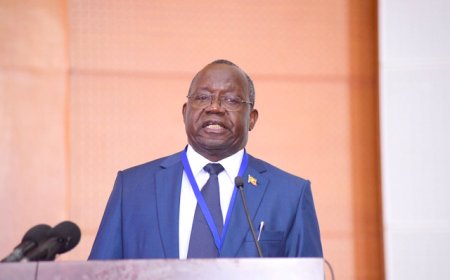President Museveni’s Skilling Hubs: A Solution to Youth Unemployment in Uganda
Kibedi says the establishment of Skilling Hubs across the country provides young people with hands-on training in diverse fields, enabling them to become not only employable but also job creators.

Uganda is a youthful nation, with over 75% of its population below the age of 30. While this presents an opportunity for economic growth, it also comes with a major challenge—youth unemployment. Many young people struggle to find jobs due to a mismatch between education and market demands. Recognizing this gap, President Yoweri Museveni has introduced Skilling Hubs as a solution to equip young Ugandans with practical, job-ready skills.
Kibedi Ismail, Principal National Guidance Officer at the Ministry of ICT and National Guidance, strongly supports this initiative and believes it is a game-changer for Uganda’s socio-economic transformation.
Kibedi says the establishment of Skilling Hubs across the country provides young people with hands-on training in diverse fields, enabling them to become not only employable but also job creators.
The Need for Skilling Hubs in Uganda
For decades, Uganda’s education system has been largely theoretical, producing graduates who lack practical skills required by employers. This has led to high levels of unemployment, with thousands of young people leaving school each year without a clear path to economic independence.
The Skilling Hubs introduced by President Museveni are designed to address this gap by offering specialized training in fields that align with Uganda’s development priorities. These hubs serve as centers for hands-on learning, focusing on areas such as:
Technical and vocational training (mechanics, construction, electrical work)
Agriculture and agro-processing (modern farming techniques, food processing)
Information and Communication Technology (ICT) (coding, digital marketing, cybersecurity)
Creative industries (fashion design, music production, arts and crafts)
Entrepreneurship and financial literacy
Kibedi says by providing young people with skills in these fields, Skilling Hubs will create a new generation of job-ready graduates who can either join the workforce or start their own businesses.
How Skilling Hubs Will Curb Unemployment
Equipping Youth with Marketable Skills
According to Kibedi, one of the biggest barriers to employment in Uganda is the lack of relevant skills. Many employers struggle to find competent workers, while young people remain jobless due to insufficient practical training. Skilling Hubs bridge this gap by equipping youth with competencies that are directly applicable to industries, making them more attractive to employers.
For example, technical training in mechanics and construction will enable young people to secure jobs in Uganda’s growing infrastructure sector, while ICT and digital skills will open up opportunities in the expanding global tech industry.
Promoting Entrepreneurship and Job Creation
Uganda’s economy cannot absorb all job seekers into formal employment. This is why it is crucial to encourage self-employment and entrepreneurship. Skilling Hubs will teach young people how to start and manage small businesses, giving them the knowledge and confidence to create jobs instead of waiting for them.
For instance, training in agro-processing will enable youth to add value to agricultural products, increasing income generation.
Similarly, those skilled in fashion and tailoring can start clothing brands and supply local and international markets.
Reducing Rural-Urban Migration
A significant number of young people migrate from rural areas to cities in search of jobs, often ending up in low-paying or informal employment. Skilling Hubs, especially those located in rural areas, will provide local opportunities for training and employment, reducing the need for migration.
By empowering rural youth with skills in modern farming techniques, for example, they can turn agriculture into a profitable business rather than abandoning it in favor of city jobs.
Bridging the Digital Divide
The world is rapidly moving towards a digital economy, and Uganda must keep pace. Skilling Hubs will integrate ICT training to ensure young Ugandans are not left behind in the digital revolution. Coding, e-commerce, and online business skills will enable them to tap into global job markets, work remotely, and compete on an international level.
Enhancing Industrial Growth and Import Substitution
For Uganda to achieve its industrialization goals, a skilled workforce is essential. Many industries currently import labor because of a lack of qualified local workers. Skilling Hubs will help reverse this trend by producing homegrown talent capable of filling these gaps.
Additionally, by training young people in manufacturing and production, Uganda can reduce reliance on imported goods, boost local industries, and strengthen the economy.
Government’s Role in Strengthening Skilling Hubs
Kibedi says that while the introduction of Skilling Hubs is a commendable initiative, their success will depend on government commitment in the following areas: Increased Funding and Expansion: More investment is needed to establish hubs in every district to ensure all youth, including those in remote areas, benefit.
Public-Private Partnerships (PPPs): Collaboration with private companies will enhance the quality of training and job placements for graduates.
Access to Start-up Capital: The government should integrate financing options like low-interest loans and grants for skilled youth who wish to start businesses.
Strengthening Certification and Accreditation: Ensuring that skills acquired at these hubs are recognized locally and internationally will enhance employment opportunities.
Monitoring and Evaluation: A strong follow-up system should be in place to assess the impact of skilling programs and make necessary improvements.
President Museveni’s Skilling Hubs are a transformative initiative that can significantly reduce unemployment and accelerate Uganda’s economic growth. By equipping young people with practical, job-ready skills, these hubs will create a generation of self-reliant and productive citizens who can drive national development.
Kibedi Ismail urges all stakeholders—government agencies, the private sector, and development partners—to rally behind this initiative and support its full implementation. The future of Uganda lies in the hands of its youth, and skilling is the key to unlocking their potential.
With the right investments and commitment, Uganda can become a nation where every young person has the skills and opportunities to thrive.






























































































































